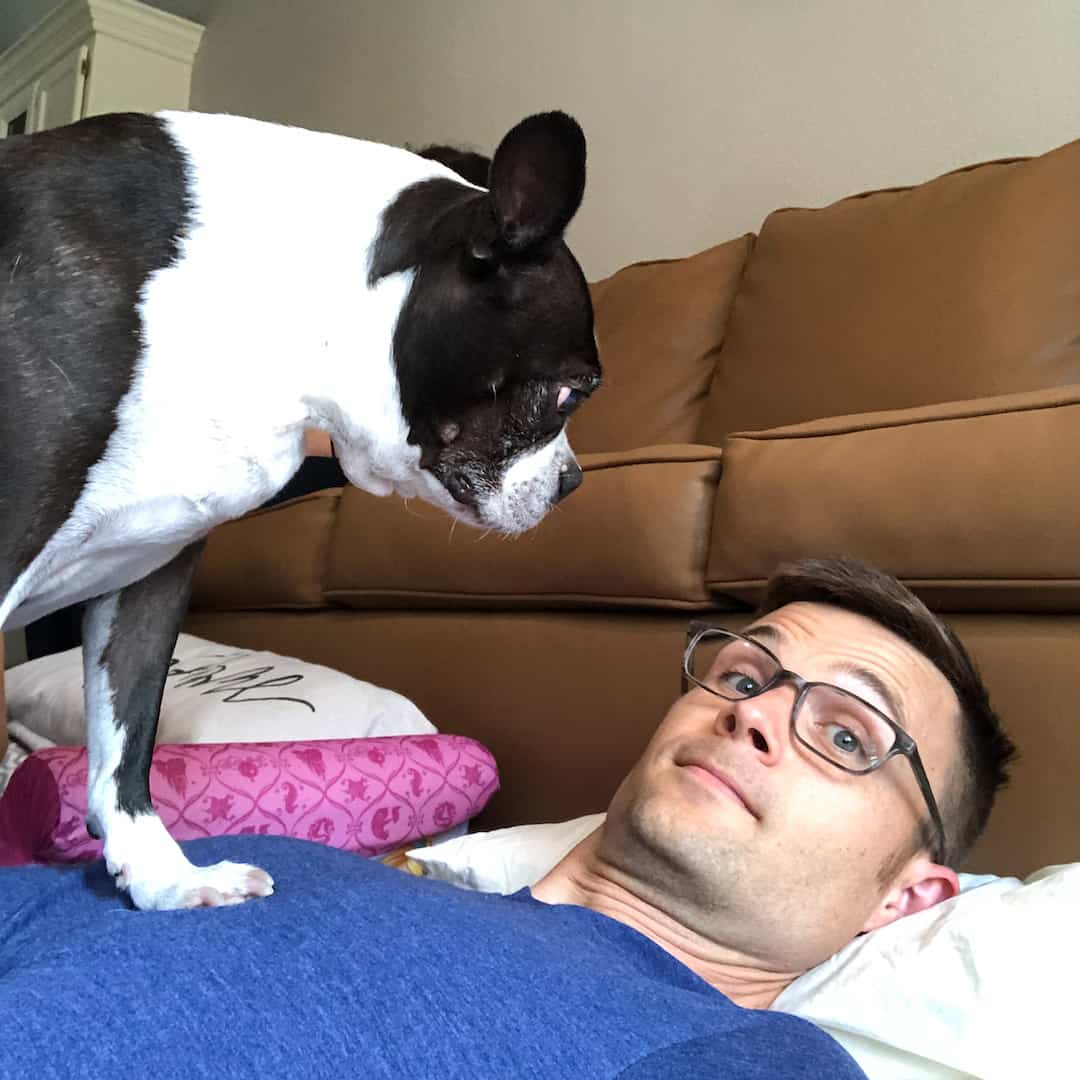Are you wondering why your Boston Terrier bites you? Well, let’s get to the bottom of this curious canine behavior together! 🐾
You might be surprised to learn that there are several reasons why your adorable Boston Terrier may resort to nipping or biting. But fear not, we’ll unravel these mysteries in no time!
From playful pups to mischievous munchkins, Boston Terriers are known for their spirited personalities. But why do they occasionally choose our hands or feet as their chew toys? Let’s find out!
Is your Boston Terrier biting you? It’s important to understand the reasons behind this behavior. Biting can be a sign of fear, aggression, or even teething. To address this issue:
- Observe their body language to determine the trigger.
- Provide appropriate chew toys to redirect their biting.
- Ensure they are getting enough exercise and mental stimulation.
- Consider enrolling in obedience training.
- Consult with a professional if the biting persists.

Why Does My Boston Terrier Bite Me?
Boston Terriers are adorable and lively dogs, but sometimes they can exhibit biting behavior that can be quite concerning for their owners. If you find yourself wondering, “Why does my Boston Terrier bite me?” you’re not alone. In this article, we will explore the possible reasons behind this behavior and provide helpful tips on how to address it effectively.
The Importance of Understanding Your Boston Terrier’s Behavior
It is crucial to develop a deep understanding of your Boston Terrier’s behavior to address any biting issues. By understanding the underlying causes, you can take appropriate steps to correct the behavior and ensure the well-being of both you and your pet. Let’s delve into the reasons why your Boston Terrier may be biting you.
1) Teething and Exploration
During their puppyhood, Boston Terriers engage in biting behavior as part of their teething process. Just like human babies, puppies also experience discomfort when their teeth are growing. To alleviate this discomfort, they bite and chew on various objects, including your hands and fingers. Additionally, puppies explore the world through their mouths, and biting becomes one of their primary ways to interact with their environment.
If you notice your Boston Terrier biting you during this stage, provide appropriate chew toys to redirect their behavior. Encourage positive chewing habits and discourage biting on your hands by offering suitable alternatives.
2) Fear, Anxiety, and Stress
Boston Terriers may resort to biting as a form of self-defense when they feel afraid, anxious, or stressed. They may find themselves in unfamiliar or threatening situations, triggering a fight-or-flight response. Biting can be their instinctive way to protect themselves or communicate their discomfort.
If your Boston Terrier seems fearful or anxious, it is vital to create a safe and calm environment for them. Provide positive reinforcement, rewards, and reassurance to help alleviate their anxiety. If the issue persists, consult with a professional dog trainer or behaviorist to address and manage their specific fears and triggers.
3) Lack of Socialization
Proper socialization is crucial for Boston Terriers to develop healthy behavior patterns. If your dog hasn’t been adequately exposed to different people, animals, and environments during their early developmental stages, they may struggle with aggression and biting as a result of fear and apprehension.
To mitigate this issue, gradually expose your Boston Terrier to new experiences, people, and other animals in a controlled and positive manner. Enroll in obedience classes or seek guidance from a professional dog trainer to help them develop positive social skills.
4) Resource Guarding
Resource guarding is another common reason behind biting behavior in Boston Terriers. Dogs can become possessive and defensive when they perceive a valuable resource, such as food, toys, or their favorite spot on the couch, is being threatened or taken away.
If you notice your Boston Terrier becoming aggressive while guarding resources, it is essential to address the issue immediately. Seek professional help to implement behavior modification techniques to ensure your dog understands that resource guarding is not acceptable.
5) Health Issues
Biting behavior can also be a sign of underlying health issues in Boston Terriers. If your dog suddenly starts biting you without any apparent reason, it is crucial to rule out any medical problems. Pain, discomfort, or neurological issues can cause a change in behavior, leading to biting tendencies.
Consult with your veterinarian to conduct a thorough examination and address any potential health concerns. Treating the underlying health issue may help alleviate the biting behavior.
6) Lack of Training and Boundaries
Without proper training and boundaries, Boston Terriers may resort to biting as their way of asserting control or seeking attention. Dogs thrive in an environment with clear rules and consistent training, and lack of structure can lead to behavioral issues, including biting.
Implement positive reinforcement training techniques to establish clear boundaries and promote desirable behavior. Enroll in obedience classes or work with a professional dog trainer to establish a healthy and respectful relationship with your Boston Terrier.
7) Excessive Excitement
Boston Terriers, being energetic and playful dogs, might bite during moments of high excitement. They may struggle with self-control when overly stimulated during playtime or encounters with their favorite humans.
If your Boston Terrier tends to bite while excited, take regular play breaks to allow them to calm down. Engage in activities that promote mental stimulation along with physical exercise to help channel their energy in a positive manner.
Key Takeaways: Why Does My Boston Terrier Bite Me?
- Boston terriers may bite due to fear or anxiety.
- Biting can be a form of communication for them.
- Lack of socialization or improper training may contribute to biting behavior.
- Pain or discomfort can also cause a Boston terrier to bite.
- Understanding their body language can help prevent bites.
Frequently Asked Questions
Are you wondering why your Boston Terrier bites you? Find answers to common questions below.
1. How can I stop my Boston Terrier from biting me?
Boston Terriers may bite due to various reasons, such as fear, anxiety, or resource guarding. To stop this behavior, it’s important to address the underlying cause. Start by analyzing the situations that trigger the biting and try to remove any potential sources of stress. Consult with a professional dog trainer or animal behaviorist for guidance on creating a behavior modification plan. Teach your dog proper obedience commands and positive reinforcement techniques to redirect their biting tendencies. Consistency, patience, and positive training methods will be key to successfully curbing biting habits.
It’s crucial to note that aggression can be a serious issue, and it’s highly recommended to seek professional help if you’re unable to address the issue on your own. A qualified trainer or behaviorist can assess your dog’s behavior thoroughly and provide tailored strategies to manage and modify the biting behavior.
2. Is biting a common behavior in Boston Terriers?
While Boston Terriers are generally friendly and gentle dogs, biting can occur occasionally. Some common reasons why Boston Terriers bite include fear, pain, anxiety, or feeling threatened. It’s important to understand that biting is a form of communication for dogs, especially when they feel stressed or fearful. If your Boston Terrier bites you or others, it’s crucial to identify and address the underlying cause to prevent future incidents.
If your Boston Terrier exhibits biting behavior frequently or shows signs of aggression, it’s essential to consult with a professional to properly assess and address the issue. They can help identify triggers, provide tailored training techniques, and guide you in modifying the behavior effectively.
3. Are there any signs that indicate my Boston Terrier may bite?
Boston Terriers usually display certain warning signs before resorting to biting. These signs may include growling, baring teeth, snapping, intense staring, raised fur, or a stiff body posture. These are clear indicators that your Boston Terrier is uncomfortable or feeling threatened. It’s crucial to recognize and respect these warning signs to prevent escalation to biting.
If you notice these signs, give your Boston Terrier space and avoid provoking further aggression. Consult with a professional dog trainer or behaviorist to work on gradually desensitizing and counter-conditioning your dog to stress-inducing situations. Early detection and appropriate training can go a long way in preventing biting incidents.
4. Could my Boston Terrier be biting out of playfulness?
Biting can be a form of play for puppies or energetic dogs, including Boston Terriers. They may nip or bite during play, but it’s important to differentiate between playful and aggressive behavior. If your Boston Terrier exhibits play-biting, it’s essential to redirect their attention onto appropriate toys and chew items. Use positive reinforcement to reward gentle play and provide plenty of mental and physical stimulation through interactive play sessions and regular exercise. Additionally, enroll your Boston Terrier in puppy socialization classes to teach them appropriate play behavior with other dogs and humans.
If play-biting escalates beyond gentle nips or becomes more forceful, consult with a professional trainer or behaviorist to address the issue promptly. They can guide you in reinforcing proper play behavior and curbing excessive or inappropriate biting.
5. Can health issues cause my Boston Terrier to bite me?
Health problems can contribute to behavior changes in Boston Terriers, including biting. Pain, discomfort, or an underlying medical condition can alter their behavior and temperament. If your Boston Terrier suddenly starts biting or displays uncharacteristic aggression, schedule a visit to the veterinarian to rule out any potential health issues. The vet will perform a thorough examination and may conduct diagnostic tests to identify any underlying problems.
Once any health issues are addressed, consult with a professional trainer or behaviorist to work on behavior modifications if necessary. Treating the underlying health problems and providing appropriate training can help alleviate biting behavior in Boston Terriers.

Summary
Sometimes, Boston Terriers may bite because they are scared or anxious. It’s important to give them space and not force interactions. Teaching them good behavior and providing plenty of exercise can also help to reduce biting incidents. Remember to always be patient and gentle with your furry friend.
If your Boston Terrier is biting frequently and aggressively, it may be a sign of a bigger issue. In this case, seeking the help of a professional trainer or veterinarian is recommended. They can help determine the cause of the biting and provide appropriate solutions to keep everyone safe and happy.
